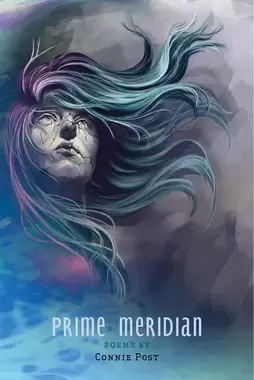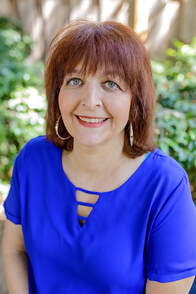Interview with Connie Post

Up the Staircase Quarterly: Following Floodwater (Glass Lyre Press 2014), Prime Meridian (Glass Lyre Press 2020) is your second full length poetry collection. This deeply communicative collection of poems confronts abuse and trauma, while also navigating survival. How did the poems come together in a format of a book? Was it a relatively quick writing experience, or did the book emerge over a long period of time? What did you personally take away from the experience of writing and then publishing these poems?
Connie Post: The poems in this book came together over a period of years. Many of the poems about abuse and trauma had been written and published in various journals. However, others felt too private to share and I didn’t send any of them out for publication. Then the #MeToo movement was born and many of my inhibitions about sharing such deep work were lifted. Many of the taboos around telling the truth about sexual abuse seemed to dissolve. The old conversation that said “you need to get over it, you need to move on” were no longer acceptable, and the more people started to listen, the more truths were told. One important component of the conversation has become about accepting how abuse affects our minds and bodies for a long time. It’s time to be heard.
I experienced the gift of catharsis while writing these poems. The publication of the whole manuscript was scary for me. In my mind I know it is a good and brave thing to tell the truth, but in my heart that part of me still stays afraid of the consequences of telling that truth.
I am very grateful to Glass Lyre Press for giving these poems a place and for supporting me in this journey. There is often an internal conversation that asks “is it too dark” and Glass Lyre Press accepted this manuscript with open arms and I am grateful beyond words to Ami Kaye and the team there.
UtSQ: I can only imagine that delving so intensely into these circumstances of trauma and their aftermath was challenging on a spiritual level. From a craft standpoint, I’m curious how this affected your ability to give voice to the trauma. Was there a piece that posed a specific challenge? Was there a poem that arrived “easiest” on the page?
CP: The delving into these past memories is part of my life on a fairly regular basis. Going through eighteen years of trauma takes its toll. My dreams and nightmares are very intense and at times they write their own stories. In the process of writing these poems, I found parts of myself I thought were lost. I found connections to nature and to the earth I never thought I’d find. The piece that came easiest was “Walking Beside October”. There is a particular way a creature scampers away that always reminds me of my own scampering as a child. It gives me pause. I develop relationships with those beings by my simple observations and by walking next to them both physically and spiritually. The poems at the end of the manuscript about my parents’ deaths and my response were hardest for me. There are many social demands and expectations around parental death that I was unable to comply with. It still gives me a deep sense of inner conflict and I’ve accepted some things simply can’t be resolved. But, I can write poems about the space in between and I think that, in and of itself, can be healing.
UtSQ: Prime Meridian suggests that nature is predictable in its cruelty, an oppositional force that the speaker is confronted with perpetually: storms, earthquakes, acid rain. Was there a specific idea that formulated the prevalent theme of nature in this work? What is nature’s role in these poems?
CP: I wrote many of the nature poems in the past 5 years. As climate change has escalated, I started to observe the response of the earth. The more nature poems I wrote, the more I started to feel the connection between the violation of the body and the violation of the earth. At some point, each will eventually say “stop”!! Whether that means the earth starts to shake or the hurricanes are worse or the body develops an auto immune disease, there is a calling, a part of the inner world that is screaming, “no more”. The ways of responding may be painful but the inner core of a person and/or the world can only take so much. As I started assembling the manuscript, I saw the parallel in my poems about nature to the poems about my abuse and I wanted to make sure they enhanced one another.
UtSQ: Animals assume many roles in Prime Meridian. Sometimes animals mirror the speaker, such as the fish in “De-boning a Fish”, the lamb in “The Day Breaks Off in Uneven Chunks” and my personal favorite, the salamander in “Walking Beside October”:
I come across a blue grey salamander
frozen
in the middle of the wooden bridge
I step over it
and it thanks me
by scurrying away
I think of the way
I used to
stop in the hallway
when you’d pass
hoping you would not
spill your Jack Daniels
down my legs
hoping your shirt buttons
were fastened
However, animals in Prime Meridian are also at times representative of a more cruel and unyielding force of nature. Why was it important to include the theme of animals in this work? Do you consider these varying representations of animals a juxtaposition or a more combined idea? How did you conceptualize this into your book?
CP: Humans are part of the animal kingdom. All our base instincts for survival live within us, even in advanced societies. I hoped to take the moments of cruelty in the animal world and display those parallels in the poems. How are we more “advanced” than animals as humans when we persecute each other so relentlessly. As I was assembling the manuscript, this symbolism occurred to me. Many of the poems explore a particular kind of noticing to both my world and animal world.
UtSQ: I would love to know more about the brilliant cover art of Prime Meridian. Can you tell us about the artist, the idea behind the work, and how it was selected as the cover?
CP: The cover artist is Tracy McQueen. As you can tell, she is simply brilliant. Tracy was involved in the creation of my cover for Floodwater too! Tracy is part of the Glass Lyre Press team and I knew I really wanted her for this book! Tracy is wonderful to work with (as is the whole Glass Lyre team) . I sent her some ideas early on. For me, it’s often hard to translate the image I have in my mind of the cover and communicate that to the artist. Tracy is very flexible and very thoughtful. After sending many jpeg ideas to her, she sent me some sketched thumbnails of the art work and once we agreed on a basic design, she took that and went with it. One of the hardest parts for me, was the expression on the woman’s face. It took a while for me to accurately describe what expression I felt fit the theme of the book. She nailed it. I was stunned at the final result and so thrilled with how it evokes everything I wanted.
UtSQ: Tell us about your first significant literary encounter. How did this experience inspire you, or shape you, into the writer you have become?
CP: My first literary encounter was in fourth grade. I started writing stories about that age, and could not be stopped. One of the first stories I wrote was called “The Ten Little McDonalds”. It was a story about a large family and all their trials. Then shortly after, I wrote a story titled “How Hinckley and the Donut factory”. My teacher loved it and seemed thrilled that I could write a story with so many details. In high school I started to write poetry. My English teacher encouraged me to keep writing. She saw something in me and made me believe in myself. I continued from that day on.
UtSQ: Finally, Connie, if you could have a meal with anyone, dead or alive, real or imaginary, who would it be, and what on earth would the two of you eat?
CP: Wow, this is a tough one, but I’d have to say Fred Rogers. I would want his kind eyes to find me. I would tell him he helped me be a better parent. I would tell him while I watched his shows with my own children, he re-parented me, too. I would tell him I used to cry while watching, and it was all necessary because he made it okay to be sad. I would tell him he healed me in a thousand uncountable ways. I would want to share cheese pizza because he is a vegetarian, and I would wear sneakers, a blue button down the front sweater, in his honor.
Interview by April Michelle Bratten.
|
Connie Post served as Poet Laureate of Livermore, California (2005 to 2009). Her work has appeared in Calyx, One, River Styx, Slipstream, Spoon River Poetry Review, Valparaiso Poetry Review, The Slippery Elm, The Pedestal Magazine, and Verse Daily. Her awards include the 2018 Liakoura Award, the 2016 Crab Creek Review Poetry Award, and the Caesura award. Her chapbook And When the Sun Drops received the Aurorean’s Editor’s Chapbook Award. Her first full length book Floodwater (Glass Lyre Press 2014) won the Lyrebird Award. Her second full length book Prime Meridian was released January 3, 2020 by Glass Lyre Press. |

